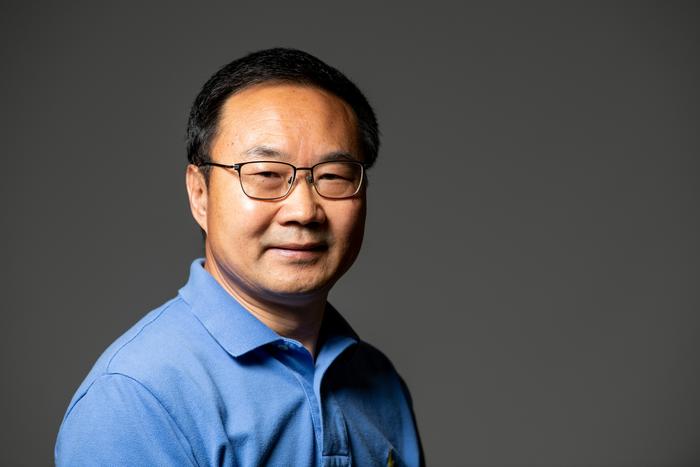In a significant recognition of scientific achievement, Zheming Wang, a distinguished chemist at the Pacific Northwest National Laboratory (PNNL), has been elected as a Fellow of the American Association for the Advancement of Science (AAAS). This prestigious designation, regarded as the pinnacle of professional honor in the scientific community, highlights Wang’s extensive contributions over a career that spans three decades. His work focuses primarily on the chemistry of advanced energy materials and radioactive substances, which are fundamental to addressing some of today’s most pressing scientific and environmental challenges.
The AAAS, known as the world’s largest multidisciplinary scientific society, celebrates contributions across a diverse range of fields—from academia to industry. This organization aims to advance science and engineering globally, advocating innovation that benefits humanity as a whole. Wang’s election to this esteemed fellowship signifies not just individual brilliance, but also the collaborative spirit of the scientific community, recognizing the collective advancements made possible through teamwork and shared vision.
Wang’s research delves deeply into the unique properties and behaviors of “f block” elements found in the periodic table. These elements, located at the bottom two rows, encompass a range of properties that include magnetic characteristics and the ability to emit vibrant colors. Some of these elements are also radioactive, making them critical to the understanding of both fundamental science and practical applications, particularly in the context of radioactive waste disposal and management, which is a pressing issue at sites controlled by the Department of Energy.
At facilities like Hanford and Savannah River, significant quantities of radioactive waste are stored, posing challenges to safety and environmental security. Wang’s expertise in the chemical nature of these f block elements positions him at the forefront of research that seeks to better understand how such materials behave in various environments. His investigations provide vital insights that could inform strategies for waste management and remediation, thus contributing to the broader goals of public safety and environmental stewardship.
Throughout his illustrious career, Wang has employed advanced laser spectroscopy techniques that allow for precise measurements of molecular interactions. These laser-based instruments are instrumental in detecting subtle changes in light and vibration, which are key to deciphering the complex chemical behaviors at play in various materials. By harnessing these advanced methods, Wang and his research team have been able to investigate phenomena that are crucial not only for understanding fundamental chemistry but also for its applications in energy and waste management.
Wang’s current work also includes participation in major multi-institutional research projects funded by the Department of Energy. One of his key roles involves contributing to the Geosciences program at PNNL while also driving innovation in the IDREAM project—an Energy Frontier Research Center. This initiative aims to tackle complex chemical challenges associated with highly radioactive waste, paving the way for solutions that have eluded scientists for over a century.
The recognition Wang receives through his AAAS fellowship is also a testament to his commitment to fostering the next generation of scientists. He has notably played a leadership role at Washington State University, where he has advised numerous graduate students. His dedication to mentorship extends to hosting and supervising not only graduate and undergraduate students but also high school students from local school districts, thereby inspiring young minds to pursue careers in science.
Wang’s published body of work includes nearly 200 peer-reviewed scientific papers, underscoring his active engagement and influence within the scientific community. Each of these publications reflects his dedication to advancing knowledge and understanding in his field while contributing to collective scientific discourse. His work embodies the principle that scientific progress relies not only on individual efforts but also heavily on collaboration and shared learning.
Colleagues, including Battelle Fellow and chemist Kevin Rosso, have praised Wang for his commitment to his research and the scientific community. They highlight how his contributions offer insights that go beyond theoretical knowledge, aiding advancements that impact real-world issues. Wang’s commitment to reinvesting in the scientific community—nurturing new talent and sharing his expertise—reinforces the interconnected nature of scientific inquiry and achievement.
As Wang prepares for the formal recognition of his achievements at a forum in Washington, D.C., on June 7, 2025, he reflects on the journey that has led him to this moment. He expresses gratitude not only for his personal accolades but also for the collaborative spirit and support received from his colleagues throughout his career. This acknowledgment extends beyond individual recognition, serving as a tribute to the collective efforts of researchers who strive to push the limits of scientific understanding.
Wang’s election as an AAAS Fellow places him alongside an illustrious group of past recipients, including notable figures in science and engineering. This legacy of excellence creates a narrative that inspires others in the scientific field, illustrating the vital role researchers can play in shaping a better future through their work. Wang’s achievements resonate as a source of encouragement for those embarking on their own scientific journeys, reaffirming the principles of curiosity, perseverance, and collaboration.
In summary, Zheming Wang’s election as a Fellow of the AAAS stands as a testament to the significant role of scientific inquiry in addressing contemporary challenges. His research into the chemistry of radioactive materials and advanced energy technologies exemplifies the critical intersection between fundamental science and practical application. Wang’s dedication to mentorship and collaboration furthers the mission of the scientific community, ensuring a thriving future for the next generation of scientists.
Subject of Research: Chemistry of radioactive and advanced energy materials
Article Title: Zheming Wang Elected as AAAS Fellow: A Tribute to Collaborative Scientific Achievement
News Publication Date: [Insert Publication Date]
Web References: [Insert Links]
References: [Insert References]
Image Credits: Andrea Starr | Pacific Northwest National Laboratory
Keywords: Chemistry, Geochemistry, Laser spectroscopy, Advanced energy materials, Radioactive waste management




